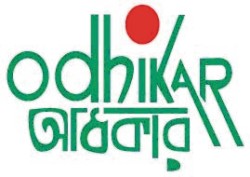Human Rights Advocacy
2010: A worrying year for human rights defenders
Bangladesh was under the State of Emergency from January 11, 2007 to December 16, 2008. It was not an easy achievement of the people of Bangladesh to oppose the unelected caretaker government backed by the army and make the transition to a government that they could vote to power. The 9th Parliamentary Election was held on December 29, 2008 where the Grand Alliance, led by the Bangladesh Awami League, won a landslide victory and formed government along with the Jatiya Party of General H.M. Ershad on January 06, 2009.
However, the overwhelming lack of political tolerance, absence of necessary and effective institutions to ensure a democratic polity and blatant violations of human rights still remain the biggest hurdles for democracy in Bangladesh. The present reality of Bangladesh proves again that while a representative government is essential for democratic practice, is not enough if the Executive, Judiciary and the Legislative fail to play their respective roles to ensure constitutional and international norms of human rights. In such situation an undemocratic and dictatorial nature of power manifests in many different ways and abuses the state machinery for partisan and narrow political gain.
The Bangladesh Awami League, in its election manifesto promised to ensure good governance, transparency and accountability. It also promised to stop extra-judicial killings. The Foreign Minister made commitments of 'zero tolerance' regarding extrajudicial killings in the Human Rights Council on March 01, 2010 and at the Universal Periodic Review Session (UPR) in Geneva in February 2009 and also when Bangladesh got elected for a 2nd term to the UN Human Rights Council on May 12, 2009. However, these are now mere words without action.
Violence against journalists; interference in electronic and print media; extra-judicial killings; custodial torture; violence against women and children are still continuing. Despite the tripartite agreement on minimum wage in the garment sector it could not be implemented causing unrest in ready made garments sector. Oppression against ethnic and religious minorities; and other human rights concerns marred 2010. Apart from all these, confrontational politics between the two major political parties and the non existence of a consensus regarding major national issues have all made the political and human rights situation in Bangladesh more vulnerable. The Opposition MP's have remained absent from Parliament for various reasons, but have enjoyed all the facilities they are entitled to. Corruption continued unabated, negatively affecting the life and livelihood of people. During 2009 the government passed an Act to put Upazillas under the control of Parliament Members. Furthermore, in 2009 the Anti-Terrorism Act was also passed mainly, it seems, to suppress dissenting voices. Such 'controlling' laws started a trend that continued into 2010.
The laws governing the activities of the National Human Rights Commission and the Information Commission restrict the independent functioning of these two institutions and the Judiciary is becoming more and more bound in a web of politicisation. Law enforcement agencies engaged in torture and ill treatment, in total confidence that their actions would be over looked. Government representatives in 2010 publicly denied the occurance of extrajudicial killings. The practice of torture and degrading treatment by the law enforcement agencies is nothing new and the indifference shown by successive government regimes regarding this practice, have only strengthened their use. In 2010, Odhikar's statistics show that the Rapid Action Battalion (RAB) was the main perpetrator of extrajudicial killings this year, while the police were the main perpetrators of torture.
The annual report of 2010 shows that acts of violence against women are no where near decreasing. Despite special criminal laws to ensure justice for acts of violence against women, lack of implementation, corruption, economic hardship and social/family programme interfere to prevent justice from being done. 2010 also show a rise in incidents of harassment and physical abuse of young women and girls.
In all, 2010 has been an 'eventful' year for perpetrations of human rights abuses, which cover all the sectors of human rights social, political, economic and cultural. It has also been a worrying year for human rights defenders, even more so due to the lack of accountability and acts of impunity, which persisted and prevented the redress of such violations.
Human rights trends are an important indicator of the health of a nation and its institutions. The more the violation of rights, the more the 'illness. Bangladesh has always suffered from 'ill health' when it comes to human rights issues and 2010 was no exception.
The reporting and publication of the human rights situation of a country is an act that requires dedication, commitment and a certain amount of fearlessness. In this regard, Odhikar has been consistent and diligent for the last 15 years, even publishing annual human rights report during the State of Emergency. In 2010, Odhikar had to pay for its human rights activities by coming under the scrutiny of the government that can only be termed as 'too close for comfort'.
This is an abridged version of Human Rights Report 2010, Odhikar Report on Bangladesh.